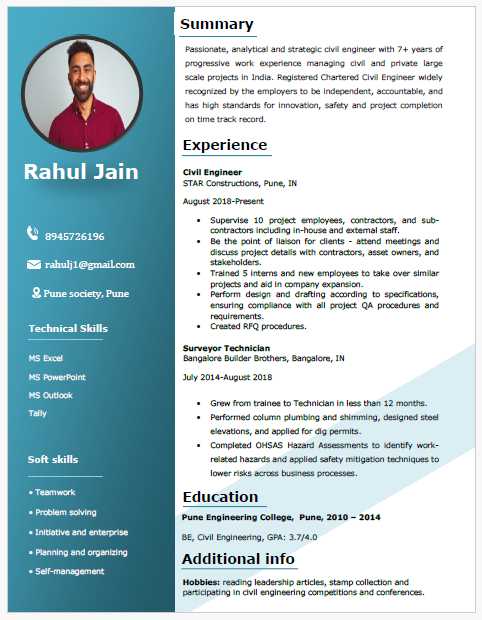Civil Engineer
BE, Civil Engineering

About this template
This is a well-designed resume which can make a significant difference in capturing the attention of hiring managers and landing your dream job.
This is a very colorful and modern resume which can help you stand out from the competition. Its vibrant design and well-organized layout effectively showcase your skills and achievements, making a lasting impression on potential employers.
Some important and common technical skills for civil engineering
For civil engineers, possessing a robust set of technical skills is crucial for successfully designing, constructing, and maintaining infrastructure projects. Here are ten important and common technical skills :
1. AutoCAD
Proficiency in AutoCAD is essential for creating precise and detailed engineering drawings and blueprints, allowing for accurate visualization and planning of construction projects.
2. Structural Analysis
Knowledge of structural analysis techniques helps engineers assess the strength and stability of structures, ensuring they can withstand various loads and stresses.
3. Project Management
Skills in project management, including scheduling, budgeting, and resource allocation, are critical for overseeing construction projects from inception to completion efficiently.
4. Geotechnical Engineering
Understanding soil mechanics and foundation design is vital for ensuring that structures are built on solid ground, preventing issues related to soil stability and settlement.
5. Construction Materials
Familiarity with different construction materials, such as concrete, steel, and asphalt, enables engineers to select appropriate materials based on project requirements and environmental conditions.
6. Surveying
Proficiency in surveying techniques and equipment, such as total stations and GPS, is necessary for accurately measuring land and preparing site layouts.
7. Environmental Engineering
Knowledge of environmental regulations and sustainable practices helps civil engineers design projects that minimize environmental impact and comply with legal standards.
8. Hydraulics and Hydrology
Understanding fluid mechanics and water resources management is crucial for designing effective drainage systems, water supply networks, and flood control measures.
9. Building Information Modeling (BIM)
Expertise in BIM software, like Revit, allows engineers to create 3D models of buildings and infrastructure, facilitating better project visualization, coordination, and collaboration.
10. Health and Safety Standards
Awareness of health and safety standards and regulations ensures that construction sites are safe for workers and the public, preventing accidents and legal issues.
Conclusion :
These technical skills equip civil engineers with the knowledge and tools needed to design, plan, and execute infrastructure projects efficiently and safely, ensuring quality and compliance with industry standards.